
Updated: Dec. 3, 2020 (Initial publication: July 15, 2020)
Publications
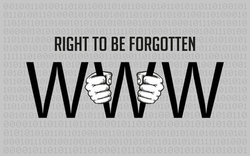
Full Reference : Frison-Roche, M.-A., Rights, primary and natural Compliance Tools, Working Paper, July 2020.
This Working paper is the basis for an article published in the collective book Compliance Tools .
____
There was a time when Regulatory techniques were above all only calculations of the best tarifications, taken up by monopolistic companies, while Compliance techniques were only obedience to all rules governing us. All this could therefore only be business of abacus and badine, used by engineers and consisted only of mechanical reflexes of "conformity" to all kinds of rules with the corset ensuring that everyone is bent in front of them
Systems have since evolved to integrate these prerogatives of each person: rights. Is this evolution really acquired? Maybe more effectively in Regulation Law than in its extension which is Compliance Law. This may be surprising since Compliance Law, in that it extends Regulatory Law in enterprises should, on the contrary, promote rights by meeting the enterprise, which is a group of people ....
In addition, if Regulation has long been the subject of a branch of Law in which rights have full place, the presentation of Compliance as "conformity", that is to say the proven assurance of obedience to all the applicable rules, leaves no space for the prerogatives of people, which appear rather as resistance to the obedience that would be expected of them. There again, the expectation of what would be a good ratio of conformity between behaviors and prescriptions would be obtained by a "design", data processing being the new form of calculation, improved by precision tools where the being human is not required
It would therefore be with regret, and probably because some constitutional jurisdictions still attach some value to fundamental rights that the systems of "conformity" of behavior to the rules make some room for the prerogatives of people, their more essential rights. It is sometimes said that this is part of the cost. It would therefore be as by "forcing" that rights would exist in Compliance systems, a kind of price that the effectiveness of Compliance must pay as a tribute to the Rule of Law principle
If in a poor definition Compliance is conceived in this only "conformity", leading to a landscape in which the behaviors of the people adjust to the rules governing the situations, Compliance being only the most "effective way" to ensure the application of the rules, in a mechanical perspective of Law, then it would effectively be necessary to reduce the prerogatives of people to a minimal part, because any "additional cost" is intended to disappear, even if it is produced here by constitutional requirements. In the looming battle between the effectiveness of the application of rules and the concern for the legal prerogatives of people who should above all obey and not claim their rights, especially their right not to obey , or their right to keep secret in Compliance techniques which is based on the centralization of information, the effectiveness of efficiency could only, by the very power of this tautology, prevail
The defeat would not be total, however, collaboration would still be possible and active between people availing themselves of their rights and Compliance Law. Indeed, in many respects, if rights have been recognized in Compliance systems, it is not only because Compliance Law, like any branch of Law, can only be deployed with respect for fundamental rights. kept by fundamental legal texts, but also because of the effectiveness of rights as " Compliance Tools".
Indeed, because they constitute a very effective "tool" to ensure the entire functioning of a system whose goals are so difficult to achieve, because every effort must be made to achieve these goals, the public authorities not only rely on the power of crucial operators, but also distribute prerogatives to people who, thus encouraged, activate the Compliance system and participate in the achievement of the "monumental goals". Rights can prove to be the most effective tools to effectively achieve the goals set, to such an extent that they can be considered as "primary tools" (I).
But it is necessary to be more ambitious, even to reverse the perspective. Indeed because all the Monumental Goals by which Compliance Law is defined can be reduced to the protection of people, that is to say to the effectiveness of their prerogatives, by a mirror effect between rights. given by Law to persons and the rights which constitute the very purpose of all Compliance Law, in particular the protection of all human beings, even if they are in a situation of great weakness, rights become a "natural tool" of Compliance Law (II).
Rights are the Compliance Law future.
Contre cela, la critique radicale, savante et fondée d'Alain Supiot, dans l'ensemble de son oeuvre et plus particulièrement dans La gouvernance par les nombres, 2015.
Sur la définition de l'entreprise comme un groupe de personnes qui se réunissent pour entreprise, v. le travail de référence d'Alain Supiot, par exemple son article d'introduction "L'entreprise...", dans l'ouvrage qu'il a dirigé L'entreprise dans la mondialisation ...., 2015 ...
Si l'entreprise pouvait renaître comme idée de cristallisation d'une idée commune entre des personnes, naturellement titulaires de droits subjectifs, exerçant ensemble leur liberté d'entreprendre pour réaliser un projet commun, ce qui correspond à la définition classique du contrat d'entreprise donnée à l'article 1832 du Code civil, cela renforcerait considérablement la présence des droits subjectifs dans le Droit de la Compliance et conforterait la nature humaniste de celui-ci.
En outre, dans une telle définition la loi de la majorité, qui n'est qu'une loi de fonctionnement d'une catégorie de sociétés que sont les sociétés de capitaux, deviendrait moins puissante, au profit des "droits propres" de tout associé (au-delà du cercle des sociétés de personnes), sans qu'il soit besoin d'aller chercher au-delà du cercle des associés ou titulaires de titres émis par la société ou l'entreprise (dit shareholders) et d'aller donner le "droit à la parole" à des personnes qui, parce qu'elles sont "concernées" (les "parties prenantes", les skateholders) ont désormais de plus en plus le "droit à la parole".
La Compliance by Design reflète ces tensions. Elles sont particulièrement bien décrites par Cécile Granier. V. ....
Contre cette conception de la légalité, qui prévoit tout et à laquelle il faudrait prouver par avance et que l'on se "conforme" entièrement, ce qui est contraire aux principes mêmes du libéralisme dont le principe est la liberté d'agir et non pas l'obéissance, Carbonnier affirme que les règles sont faites ne pas s'appliquer et qu'elles ne sont que le "mince vernis" des choses, qu'il convenait de se méfier de la "passion du Droit". V. not. son dernier ouvrage Droit et passion du droit sous la Vième République, 1995. Carbonnier est considéré comme le plus grand juriste français du XXième siècle. Il rédigea les lois qui réformèrent en profondeur le Code civil et publia des ouvrages sur "l'art législatif".
Au contraire, l'Etat de Droit n'est pas un coût extérieur au système de Compliance efficace, que celui-ci doit internaliser. Il est le fondement même du Droit de la Compliance. Voir dans ce sens la démonstration faite par le président de la Cour de Justice de l'Union européenne, Koen Laearnt, ..., in Pour une Europe de la Compliance, 2019.
Sur la démonstration comme quoi la Constitution, en ce qu'elle contient de l'incalculable, est broyée dans cette façon de faire, v. Alain Supiot, Intervention 2019.

Nov. 1, 2020
Publications

This working paper served as a basis for an interview organized by Olivia Dufour in French in Actu-juridiques-Lextenso on 11st of January 2021.
Sept. 16, 2020
Publications

🌐follow Marie-Anne Frison-Roche on LinkedIn
🌐subscribe to the Newsletter MAFR Regulation, Compliance, Law
____
Full reference: M.-A. Frison-Roche, Se tenir bien dans l'espace numérique, in Penser le droit de la pensée. Mélanges en l'honneur de Michel Vivant, Lexis Nexis and Dalloz, 2020, pp. 155-168.
____
📝Read the article (in French)
____
English summary of the article: The digital space is one of the scarce spaces not framed by a specific branch of Law, Freedom also offering opportunity to its actors to not "behave well", that is to express and diffuse broadly and immediately hateful thoughts through Hate speechs, which remained before in private or limited circles. The intimacy of Law and of the legal notion of Person is broken: Digital permits to individuals or organizations to act as demultiplied and anonymous characters, digital depersonalized actors who carry behaviors that are hurtful to other's dignity.
Against that, Compliance Law offers an appropriate solution: internalizing in digital crucial operators the mission to disciplinary and substantially hold the digital space. The digital space has been structured by powerful firms able to maintain order. Because Law must not reduce digital space to be only a neutral market of digital prestations, these crucial operators, like social networks or search engines, must be forced to substantially control behaviors. It could be about an obligation of internet users to act with their face uncover, "real identity" policy controlled by firms, and to respect others' rights, privacy rights, dignity, intellectual property rights. In their Regulatory function, digital crucial firms must be supervised by public authorities.
Thus, Compliance law substantially defined is the protector of the person as "subject of law" in the digital space, by the respect that others must have, this space passing from the status of free space to the one of civilized space, in which everyone is obliged to behave well.
______
Read to go further:
- Frison-Roche, M.-A., L'apport du Droit de la Compliance à la gouvernance d'Internet, 2019
- Frison-Roche, M.-A. (dir.), Internet, un espace d'interrégulation, 2016

June 18, 2020
Publications

♾️follow Marie-Anne Frison-Roche on LinkedIn
♾️subscribe to the Newsletter MAFR Regulation, Compliance, Law
____
► Full Reference: M.-A. Frison-Roche, The dreamed Compliance Law, Working Paper, June 2020.
____
This Working Paper, "The Dreamed Compliance Law", is the basis for an article, written in French, "La compliance" (Compliance), inserted in the collective work to be published under the direction of Jean-Baptiste Racine, Le Droit économique du XXIème siècle (The XXIe century Economic Law , in the Serie Droit & Economie, LGDJ-Lextenso, 2020.
________
No one can know what the Law of the 21st century will be. Pretending to know it is just not to realize its ignorance. Why then writing about it, since the future is always surprising?
One can only write about the unknown part of the Law of tomorrow. If the future is then modeled on what was written, so much the better for the prophet, a tribute that can, for example, be paid to Pierre Godé
Lévi-Strauss argued that teaching is defined as dreaming out loud. Teaching and describing the Law of a century that we will never know gives even more freedom to dream about it. This freedom increases when the object is a branch of Law in the process of being born, state of the stammering "Compliance Law" of which some still maintain, as it was made for Regulation Law, that there is not existing. The hand can then, as it pleases, trace its beautiful or hideous features: what face will Compliance Law have, as soon as we assume that it will exist?
It may as well be a nightmare (I) as a happy dream (II).
It is up to us to choose in which category this branch of Law will flourish. Because what we can be sure of is this fulfillment. It is certainly already taking sides to presuppose the very existence of Compliance Law. Not only to consider it possibility with hostility because to be an enemy of something or someone is already to recognize their existence. Before that, two objections radically block the very existence of Compliance Law and their shadow remains in the future of it
Firstly, it is said that Compliance does not come under Law, but for example only ethics since it would consist in keeping well in companies which care about the interest of others or the planet, for example by spontaneous care of the environment; Compliance being a crystallization of social responsibility, the one for which we have our conscience, we express our "raison d'être" and we are not accountable
Second, there would be many Compliance mechanisms but insufficient to constitute a branch of Law. Indeed we would find Compliance in Company Law, Labor Law, Financial Law, Banking Law, Criminal Law, Administrative Law, European Law, International Law, etc.
These classic branches, which have been formed for so long, depending on the point of view adopted, would gain in modernity or be threatened with decay by this kind of extension which will be Compliance. There would thus be as many "little legal sectoral rules" as there are branches of law. These new internal developments would be like a new bud, on which care should be taken - if the tree regains its strength - or a weed to be eradicated - if the French garden loses its perspective.
Thus the matter being scattered as many as specialist lawyers, often criminalists or specialists in banking and Financial Law, then tomorrow all specialists in all branches of Law, this could constitute the most radical obstacle to the constitution of Compliance Law. Indeed, we would come back to confuse Compliance and the "modernization" of Law itself as a whole, since it would only be a question of perfecting each of the classic branches of the legal system.
If we keep in this half-sleep that is any projection in the future the hope of a constituted branch of Law, we must discard these two perspectives of annihilation, either in the total absence of Law or in recovery by all Law. To dismiss the sorrowful spirits who see no future in Compliance and keep only its enemies in the space of this article, let us assume that Compliance Law will exist in the 21st century. In what form and by what means, in the palm of which institutions, in the shadow of which legal system? Since it is a question of projecting ourselves onto the black screen of our nights of dreamy lawyers, let us take the current state only as a trailer. Like the one developed by the genius who by the contempt not only brought down into the flames of hell the cinema which has become a consumer industry with which producers force-feed us but offered us the vision of its future. What is what we see today the trailer? We let our imagination run wild since the trailer films are autonomous works compared to the film which follows them.
We have no idea what will happen and what we are watching from the brief and violent current images of Compliance Law, the cinema of which rather makes a hero of the whistleblower
Everything will depend on the concept that we will retain of Compliance Law. Because the script is not written, because Compliance Law is a Law with a political dimension, that it is defined by the ambitions that we can claim to have by setting monumental goals that we are going to achieve, a claim that will make it one major branch of the Law of tomorrow, or we can abandon any claim, lower our heads and arms, and reject any claim. It is then that the power of Compliance Law, which will be no less great, will turn against us, human beings, as in a nightmare.
Mélanges Pierre Godé, off-trade book, 2019.
Godé, P., Le Droit de l'avenir (Un Droit en devenir), 1999.
It is in particular the idea of the movement of analysis of Law & Literature which poses that by telling the past in one way or another, by thus inventing it, Law, and in particular the Judge, invents the future and being written, creates it. On this movement which was powerful in the United States, v. Cabrillac, R. et Frison-Roche, M.-A., Droit et Littérature, à paraître.
See infra I. Compliance Law as nightmarish octopus.
On the fact that "social responsibility" makes it possible not to be legally responsible, cf. Supiot, A., Du nouveau au self-service normatif: la responsabilité sociale des entreprises, 2004; this is not the subject of this article and this question will not be developed here.
See, for instance, ..., Replace Regulation by norm by Regulation by Data, 2020.
See, for instance, Frison-Roche, M.-A., Compliance Law (monography), 2016 ; Compliance Law, 2020.
On what the cinema does with the whistleblower, with the availability of trailers and extracts from the films, see Frison-Roche, M.-A., introduction of the article The impossible unicity of the legal category of whistleblowers, 2019.
Frison-Roche, M.-A., ... (retrouver sur LinkedIn).

April 24, 2020
Publications

Its subject is the confrontation between the current health crisis situation and the Compliance Law.
Summary. After defining Compliance Law, distinguishing the procedural and poor definition and the substantial and rich definition, the starting point is to admit the aporia: the type of health crisis caused by Covid-19 will be renewed and it is imperative to prevent it, even to manage it, then to organize the crisis exit. Public Authorities are legitimate to do so, but because this type of crisis being global and the State being consubstantially linked to borders, States are hardly powerful. Their traditional International Law shows their limits in this current crisis and one cannot hope that this configulration will improve radically.
In contrast, some companies and markets, notably the financial markets, are global. But the markets are not legitimate to carry out such missions and counting on the generosity of certain large companies is far too fragile in front of the "monumental goal" that is the prevention of the next health crisis, crisis which must never happen.
How to get out of this aporia?
By Compliance Law, basis of, in a literal and strong sense, the "Law of the Future".
We need to be inspired by the Banking and Financial Compliance Law. Designed in the United States after the 1929 crisis to tend towards the "monumental goal" of the absence of a new devastating crisis in the country and the world, this set of new legal mechanisms gave duty and power of supervision, regulation and compliance to market authorities and central bankers. These are independent of governments but in constant contact with them. Today, they claim to have as first priority the fight against climate change. Now and for the future, they must also be given the responsibility and the powers to prevent a global health disaster, similar to a global ecological disaster, similar to a global financial disaster. This does not require a modification of the texts because their mandate consists in fighting instability. Stability must become a primary legal principle, of which the fight against monetary instability was only a first example. By the new use that central banks must make of it by preventing and managing health crises, Compliance Law will ensure that the future will be not catastrophic.

March 22, 2020
Publications

This working paper is the basis for an article in the French Law Journal Le Clunet.
When we compare the terms "Compliance" and "Extraterritoriality", it is often with dissatisfaction, even anger and indignation. On the momentum, after having expressed a principle of disapproval of such a merger, attention is focused on how we can fight against it, to break the link between Compliance and Extraterritoriality. But do we have to go so fast? Is this negative initial assessment correct?
Indeed, thus gone, it is frequently explained that the binding mechanisms of Compliance are suffered, that they come from abroad!footnote-1750, that they apply with efficiency but in an illegitimate way, without agreement of the one who must submit to it, whose resistance is therefore certainly ineffective but nevertheless justified. In the same spirit, when we start to shell the cases, like so many scars, sort of rosary, even crown of thorns, BNPP case!footnote-1718, Astom case!footnote-1717, etc., the wounds not yet closed turn into reproaches made against the rules, public authorities, even reproaches made against named people.
We are leaving this kind of complaint against X, which targets what would be this appalling "Compliance", this Law which would be both hostile and mechanical which would not have been able to stay within the limits of borders, Compliance being thus placed in contrast to sovereignty and protection, which presuppose staying within its limits!footnote-1716 and being able to protect companies from abroad. More concretely, this presentation targets more directly the United States, which uses "the legal weapon", slipped under what is then designated as "the artifice of the Law" with extraterritorial scope. But this effect would in reality be the very object of the whole: their hegemonic will to better organize at least a global racket, notably through the Foreign Corrupt Practices Act (FCPA) and at best a world government through notably the embargoes.Those who believed otherwise would be naive or foolish. This silences the opponents because who likes this costume? So the world would be put in a ruled cut; what the mafia could not have done, Compliance Law would have obtained, offering the whole world to the United States thanks to the extraterritoriality of its national Law.
Compliance Law would thus become the very negation of Law, since it has the effect, even the purpose (barely concealed by strategic, powerful and shameless States), of counting borders for nothing, whereas Public International Law, in that it is built between the sovereign subjects of law that are the States presupposes the primary respect for borders to better exceed them while Private International Law takes the same postulate to better welcome foreign Law in situations presenting a foreign element!footnote-1726. Jurists believed in the force of Law; by Compliance, we would return to the sad reality that only the powerful, here the United States, dominate and - ironically - it is under the pretext of Law that they do it. It would be necessary to be well duped, or accomplice, to see there still legal where there is only the balance of powers. When one is more intelligent or skilful than that, one understands that the "small" can only be "subject" to the Compliance Law, one would have to be powerful to be the normative source and its enforcement agent. It is then towards this mis-named Department of Justice (DoJ) that the fearful, hateful and resigned glances turn.
If you see it that way, what should you do then? The answer is obvious: react!
It is necessary to save the sovereignty, France, companies, the Law itself. If that is how the question is posed, how can we disagree? It is therefore necessary to destroy the Compliance Law and the extra-territoriality of American Law which had found this "Trojan horse", an expression so frequently used. This is the basis for the administrative reports available, for example the Berger-Lellouche!footnote-1719 parliamentary reports and the Gauvainfootnote-1720 report. Both of them broadly develop the two preceding claims, namely that the extra-priority of compliance mechanisms is illegitimate and harmful, since it is a mechanism invented by the Americans and harming the Europeans, or even invented by the Americans to harm Europeans, the description being made in much more violent terms than those used here. The description seems acquired, the reflections therefore relate to the remedies. The reaction is most often to "block" the Compliance Law in its extraterritorial effect.
But without discussing the effectiveness of the remedies proposed downstream, it is necessary to return to this description so widely shared made upstream. Because many elements on the contrary lead to affirm that ComplianceLaw first of all and by nature can only be extraterritorial and that it must be. Whether or not the State in which it was created has malicious intentions. The description which is made to us most often describes particular cases from which we draw generalities, but we cannot reduce Compliance Law to the already cooled cases, as BNPP case, or to the always hot case of the American embargo on Iran. Furthermore, one cannot take the issue of embargoes and draw conclusions, legitimate for it, but which would apply to the whole of Compliance Law. The fact that theCompliance Law is a branch of Law at the stage still of emergence can lead to this confusion which consists in taking the part for the whole, but it is very regrettable because what is justified for the embargoes does not is in no way relevant for all Compliance Law, of which precisely the Law of embargoes is only a small part, even an abusive use. This overlapping is not often perceived, because the definition of Compliance Law and its criterion are not clearly enough defined, namely the existence of a "monumental goal"!footnote-1725, which does not exist in an embargo decided unilaterally by an order decreed by the President of the United States, but which exists in all other cases and fully justifies extraterritoriality, extraterritoriality which is even consubstantial with Compliance Law (I).
Once we have distinguished the embargoes, as an atypical, sometimes even illegitimate part, of Compliance Law, we should continue this work of distinction by emphasizing that the United States has certainly invented Compliance Law!footnote-1721 but only developed a mechanical concept for the prevention and management of systemic risks. Europe has taken up this systemic conception of the protection of systems, for example financial or banking, but superimposed another conception, drawing on its deep humanist tradition!footnote-1722, whose protection of personal data is only an example and whose monumental goal is the protection of the human being. This primary concern then justifies the European use of Compliance mechanisms to interfere with global objects regardless of their location, especially the environment, and to block the entry onto the ground of objects that enter, which is contrary to Competition Law but builds a legitimate barrier under this Compliance Law, in the indifference of an extraterritorial origin (II).
Indeed, this branch of the new Law which is Compliance Law is not reducible to Competition Law!footnote-1723, any more than it is not reducible to a method. It is a substantial, extraterritorial Law because the "monumental goals" which give it substantial unity are extraterritorial. This can directly contribute to the future of a Europe which on the one hand will be able to pursue, in an extraterritorial manner, monumental humanist goals, in the field of the environment or the protection of personal information or access to the Law (in particular by the technique of compliance programs) and which, on the other hand, by the techniques of traceability of products!footnote-1724, will have the means not to bring in products manufactured in an indecent manner, except in countries which do not grant value than in Competition Law to enter the WTO.
Read the developments below.

Updated: Sept. 24, 2019 (Initial publication: Aug. 31, 2019)
Publications

Summary : In August 2019, about the fire devastating the Amazon, the French Minister of Ecology says that this fact "is not just the business of a state" (n'est pas que l'affaire d'un Etat). This assertion denies the postulates of Public International Iaw (I). This supposes a new system, based on the idea that the power of the State on its territory is erased when the object that is there is no longer related to this "part" but to the All that is Universe (II). Let's accept the augur. First question: if it is not only the case of a State, whose business is it? (III). Second question: to anticipate the other cases that fall under this regime, what should be the criteria in the name of which the All will have to prevail over the part and who will then take care of the case of which the "local" State is divested? (IV). Because the perspective goes beyond the environment, beyond Brazil, beyond the States. It leads to Compliance Law animated by "monumental goals" that are the concern for the Universe and humans, in a humanist spirit. Let's go.
___
On August 27, 2019, on the French radio France Inter, Elisabeth Borne, French Minister of Ecology (Transition écologique) expresses it clearly: "Quand on est sur un enjeu tel que l'Amazonie, ça n'est pas que l'affaire d'un État", that can be translated : "When we are on a stake such as the Amazon, it is not only the business of one State ".
Starting from one case, "the Amazon", the Minister, thus taking up the position of the French President, associates a general consequence: "it is not only the affair of one State".
This is not a trivial sentence.
This affirmation denies, and why not, the entire system of Public International Law (I). By a new reasoning based on the idea that the All prevails, as by an effect of nature, on the Part (II).
Admitting this, it leads to opening two sets of questions. The first is related to the following main question: if it is not only the case of one State, of which is this the concern (III)? The second set of questions revolves around the questioning of the criteria on behalf of which other cases must be seized in the name of "All " and how to do it (IV).
A. The postulate of Public (and Private) International Law: parties (States) which, because of common interests, are in contact
The notion of State includes in its very definition the notion of territory (a territory, a population, institutions).
Thus the State governs through its institutions what is happening on its territory. For example, if there is a fire, or a risk of fire, the State makes arrangements through all legal, financial, technical and human instruments available to it. It is accountable for what it does through its political and legal responsibility.
When what is happening on its territory exceeds this one, in fact (epidemic, catastrophe with the consequences exceeding the borders, migrations, etc.) either according to its own opinion or according to that of the other States, the States, being sovereign subjects of Law in the international system, act together on a pre-built legal basis: bilateral or/and multilateral treaties!footnote-1675, having created legal integrated zones (like the European Union or the United States) or international institutions (like the IMF).
A particular technique has been developed for several millennia - but here again the seniority is not sufficient to keep the system: diplomacy, anchored in each state in a particular ministry: the Ministry of Foreign Affairs, which each national government has. If one State totally excludes one phenomenon in the territory of another, the progressive procedure of ceasing diplomatic ties begins.
This can result in wars.
In the "case of the Amazon" both the President of Brazil and the President of the United States stick to the classical construction of Law.
Indeed, the former asserted that the Amazon is in the territory of Brazil, thus falls under the jurisdiction of the power of the Brazilian State and the Brazilian Law, from which it follows that another State does not have to come to interfere. However, the French President takes the floor not as this forest extends also on a French territory but as it is the business of the World. On the contrary, the President of Brazil claims the closing effect, which excludes a third State from taking over directly something - even a difficulty - that takes place in the territory of another.
The President of the US federal State has said that these are joint decisions between the President of Brazil and other heads of State, sovereign subjects of Law, who must agree to organize a solution to solve a local problem . Because in the same way that States can declare war, they can help each other!footnote-1676.
The whole Public (and Private) International Law is therefore based on this assumption: "parts" of the world, on which sovereign parties (States) have taken contact, because circumstances make something that falls within one of them or several others.
This is precisely what is called into question. The notion of the "right of interference", whose evocation we hardly hear any more, had already done so. But on another basis.
B. The "right of interference": idea that somebody can directly interfere with what happens in a country , an idea that does not question the postulate of the International Maw, an idea that rests on something else: a " right for the other "
The "right of interference" is the idea that in certain territories, things happen that are inadmissible.
In memory of the jus cogens, a kind of "Natural Law" of Public International Law, Another, that could be another state, can come to meddle with what is happening in a territory that is closed, without declaring war. to the state that keeps its borders.
It is the need of others, for example those who die in mass on this territory, or the nature that is devastated in the indifference of the State on whose soil the disaster is happening, which founds this "right" of another state to come and take charge.
The foundation of this "right" is therefore a "duty".
C. The new idea: a territory is only part of the Globe, whose fate is everyone's concern
The idea is new because it is not based on altruism. And no more about self-interest. Yet, de facto and de jure , the Amazon is not on the sole territory of Brazil.
France is particularly well placed to say something about it since part of the Amazon is on French territory.
Thus the inaction of the main concerned Brazil directly affects the interest of France, a "forest" being a block that can not be divided. If we were in Property Law, we would say that we are in indivision with Brazil and that in this respect, with the other States on whose territories this forest extends, a solution must be found.
Because of the indivisibility of this particular object which is this particular fores!footnote-1644, it is necessary that the States whose territory is concerned have a say in the matter.
But this is not the argument put forward by France, particularly by the President of the Republic.
It is said that the whole world is concerned about the fate of the Amazon. It could be said that, in this respect, when what could be described as a "global forest" is well treated, its management does indeed fall within the power of Brazil, Brazilian companies and the Brazilian State, but when it is abused to the point of seeing its future compromised, when fires may make it disappear, then this forest appears not to be localized in Brazil but being located in the World, of which Brazil is only a part!footnote-1648.
This reasoning, which then gives voice to everyone, for in the world every state is included in it, is a new reasoning.
The economic-political theory of the "commons" does not account for it because it is not a very legal theory!footnote-1656.
II. THE NEW REASONING THAT COVERS THE CLASSIC REASONING OF PUBLIC INTERNATIONAL LAW
The new reasoning adopted by the Minister consists in saying that the Amazon does not concern only Brazil. This forest should therefore be directly related to the World (A). This is a welcome change in the system but based on a paradox (B).
A. When the Amazon is in danger of death, then it should no longer be attached to this part of the World that is Brazil, but directly to the World
This forest is presented as the "lung" of the planet, it is the "future" of humanity. In this, it can concern only one State, not even the one on whose territory this "Humanity good" is located!footnote-1643.
As such, without the need to declare war to Brazil, another State may speak, for example the French State through the one that represents it in the international order, that is to say its President, to say what to do, since according to him the President of Brazil does not say or do what it is absolutely necessary to do for the whole planet and for the future of Humanity.
This induces a complete renewal of international institutions.
Indeed a direct attachment to the World and no longer to Brazil gives the forest object a special status because of a goal that exceeds Brazil: save the Amazon would impose because it would save the world. Therefore, it can no longer be the subject of Brazil, which would be like "dispossessed" by a goal that is imposed on it: to save the Amazon rainforest, even though it is mainly on its territory, while other States become legitimate to dispose of this object, even if the forest would not be in part in their territory, even if they would not be affected in their own interests.
This contradicts all Public International Law!footnote-1645; because the agreement of the political representatives of Brazil is no longer required and no one yet evokes the need to declare war to Brazil, and fortunately!
Such an upheaval justifies that such an affirmation is accepted with difficulty. One understands better than first consequence, which is not so innocuous, one of the first rules of diplomacy which is the politeness, between the heads of state, with regard to the spouses of these , have be broken!footnote-1657, that the remarks have slipped on personal questions, etc.
B. A welcome but paradoxical change in the system
Why not change the system?
This is difficult to admit, not only because it is brutal, but because it is paradoxical.
The paradox is the following. It is recognized that the theme of the disappearance of borders by "globalization"!footnote-1647 no longer reproduces the reality of facts!footnote-1646, especially not the Chinese situation, the digitalization having on the contrary allowed the construction of even stronger boundaries. What we called "globalization" now belongs to the pastWhat we called "globalization" now belongs to the past!footnote-1660. So today we should recognize on one side the reality of borders - which had not disappeared or are reborn - but only to better step over them, since - based on the concern of the world - states, yet each in their borders, would be legitimate to go directly to intervene in the business of others.
The paradox is therefore, on the one hand, the rejection of the allegation of a de facto disappearance of borders by an economic interdependence, technology having denied "globalization" as a fact !footnote-1649 and the linked resurgence of borders allowing States to affirm more than ever that they would be "sovereign masters at home", which should logically lead to let Brazil decide for the Amazon, while yet on the other side we witness the questioning of the postulate of Public International Law as recognition of sovereignty and construction from agreements between states, requiring the agreement of the state whose territory is concerned (except war), questioning which leads to allow all to meddle with the fate of the Amazon, as if there was no border.
This paradox leads to two questions.
The first question is: if "it's not juste one State affair", who's concerned?
The second question is: after the "case of the Amazon", what are the other cases? And how are we going to provide solutions, if we no longer have the solutions of Public International Law, that is to say, the agreement of the country whose territory is concerned and which we do not want not go to war?
If we have clear ideas on the answers to be given to these two sets of questions, then because indeed when the future of all is in progress it can not be the affair of a single State, it is necessary to question Public International Law. But do we have clear ideas on these two questions? And what are the possibilities for possible solutions?
See the text following below.
Updated: Sept. 5, 2019 (Initial publication: April 30, 2019)
Publications
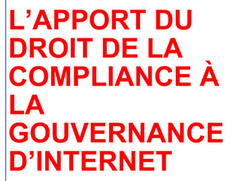
🌐 follow Marie-Anne Frison-Roche on LinkedIn
🌐subscribe to the Newsletter MAFR Regulation, Compliance, Law
____
► Full Reference: M.-A. Frison-Roche, L'apport du Droit de la Compliance dans la Gouvernance d'Internet (The contribution of Compliance Law to the Internet Governance), Report asked by the French Government, published the 15th of July 2019, 139 p.
___
► Report Summary. Governing the Internet? Compliance Law can help.
Compliance Law is for the Policy Maker to aim for global goals that they require to be achieved by companies in a position to do so. In the digital space built on the sole principle of Liberty, the Politics must insert a second principle: the Person. The respect of this One, in balance with the Freedom, can be required by the Policy Maker via Compliance Law, which internalises this specific pretention in the digital companies. Liberalism and Humanism become the two pillars of Internet Governance.
The humanism of European Compliance Law then enriches US Compliance law. The crucial digital operators thus forced, like Facebook, YouTube, Google, etc., must then exercise powers only to better achieve these goals to protect persons (against hatred, inadequate exploitation of data, terrorism, violation of intellectual property, etc.). They must guarantee the rights of individuals, including intellectual property rights. To do this, they must be recognized as "second level regulators", supervised by Public Authorities.
This governance of the Internet by Compliance Law is ongoing. By the European Banking Union. By green finance. By the GDPR. We must force the line and give unity and simplicity that are still lacking, by infusing a political dimension to Compliance: the Person. The European Court of Justice has always done it. The European Commission through its DG Connect is ready.
► 📓 Read the reporte (in French)
📝 Read the Report Summary in 3 pages (in English)
📝 Read the Report Summary in 6 pages (in English)
____
► Plan of the Report (4 chapters): an ascertainment of the digitization of the world (1), the challenge of civilization that this constitutes (2), the relations of Compliance mechanisms as it should be conceived between Europe and the United States, not to mention that the world is not limited to them, with the concrete solutions that result from this (3) and concrete practical solutions to better organize an effective digital governance, inspired by what is particularly in the banking sector, and continuing what has already been done in Europe in the digital field, which has already made it exemplary and what it must continue, France can be force of proposal by the example (4).
____
📝 Read the written presentation of the Report done by Minister Cédric O (in French).
____
💬 Read the interview published the 18 July 2019 : "Gouvernance d'Internet : un enjeu de civilisation" ( "Governing Internet: an Issue of Civilization"), given in French,
📻 Listen the Radio broadcast of July 21, 2019 during which its consequences are applied to the cryptocurrency "Libra" (given in French)
🏛 Presentation of the Report to the Conseil Supérieur de l'Audiovisuel- CSA (French Council of Audiovisual) on Septembre 5, by a discussion with its members presentation (in French)
💬 Read the Interview published the 20 December 2019 : "Le droit de la compliance pour réguler l'Internet" ("Compliance Law for regulate Internet"), given in French
____
read below the 54 propositions of the Report ⤵️
Feb. 13, 2019
Publications
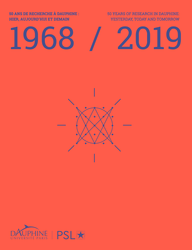
Full reference: Frison-Roche, M.-A., Creating "Regulation Law" at Dauphine, in Huault, I. and Bouchard, B. (ed.), 50 years of Research in Dauphine. 1968-2019, 2019, pp. 110-114
Read Marie-Anne Frison-Roche's article (in French)
Read also:
The foreword of the book written by Bruno Bouchard (in French)
Nov. 7, 2018
Publications
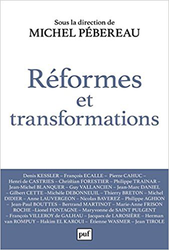
►Référence complète : M.-A. Frison-Roche, M.-A., "Le système juridique français constitue-t-il un atout ou un handicap pour nos entreprises et nos territoires ?" in M. Pébereau, M. (dir.), Réformes et transformations, PUF, 2018.
____
Résumé de l'article : La formulation de la question posée est comme une fermeture de tout débat, posant implicitement que le Droit devrait servir l'Économie et le servir "bien" (atout) plutôt que "mal" (handicap), alors qu'il faudrait s'accorder sur une méthode consistant pour chaque discipline à l'œuvre à ne prendre l'ascendant sur l'autre (I). Ce jugement doit être global, porter sur le droit en tant qu'il est un système. Quand on lit les différents travaux, ils ne portent que sur tel ou tel mécanisme, au mieux sur tel ou tel branche du Droit, ce qui méconnaît le fait que le Droit français est un système (II). C'est pourtant bien qu'en tant qu'il est un système que le Droit français doit être saisi, l’appréhender non seulement par ses signaux forts, mais aussi par ses signaux faibles Ceux-ci peuvent constituer les atouts les plus précieux (III). Plus encore, il est fructueux de donner plein effet à ce terme si particulier et peu souvent valorisé qu’est le terme de « territoire », placé dans la question, terme si ancien et aujourd'hui si intriguant puisque de "nouveaux territoires" s'offrent à nous : le digital, l’Europe. Et là, le système juridique français, que peut-il apporter, portant alors ce que l’on pourrait appeler la gloire française, car le Droit est comme le Politique une discipline qui porte des « prétentions », par exemple celle de construire l’Europe, par exemple l’Europe digitale (IV).
____
____
🚧Lire le document de travail ayant servi de base à l'article.
________

Updated: Sept. 1, 2018 (Initial publication: May 10, 2018)
Publications

This working paper has served as a basis for an article written in French in the book Compliance : Entreprise, Régulateur, Juge ("Compliance: Enterprise, Regulator, Judge"), published in May 2018 in the Regulations Series of Dalloz editions (Paris).
See the other books published in this collection (presentation in French), directed by Marie-Anne Frison-Roche (presentation in English).
ABSTRACT: The Company, the Regulator and the Judge are three key figures for the construction of an emerging Compliance Law. An important risk lies in a confusion of their respective roles, the company becoming a regulator, the regulator becoming a board of a place that goes to the conquest of others, the judge standing back. It is appropriate that each plays his role and that their respective function is not distorted. If this confusion is avoided, then the points of contact can multiply and one observes it. But as soon as everyone remains in its place, we can go further than these points of contact and if they agreed, the three characters can reach common goals. This is all the more legitimate since Compliance Law, as Regulation Law, is teleological in nature, which makes these branches of law profoundly political. These common goals are technical, such as risk prevention. They can be more political and higher, if there is a shared will, without ever one of the characters being captured by another: it is then to concern by the human being. The designation of this common goal to the Company, the Regulator and the Judge can be expressed in one word: Europe.

June 7, 2018
Publications

L'on semble bien obnubilé par le "RGPD"... Que l'on étudie virgule après virgule. Cela se comprend puisqu'il faut bien des modes d'emploi.
Il convient aussi de regarder ce qui a constitué son terrain et son contexte, avant de comprendre de quoi ce Règlement est porteur.
Pour le comprendre, il faut sans doute regarder certains détails, certains mots (sa "lettre"), son but (son "esprit"). D'ailleurs,classiquement en Droit dans le Code civil il est rappelé que pour connaître l'esprit d'un texte il faut partir de sa lettre, c'est-à-dire de ses mots. Et là, l'on est bien ennuyé pour que nous ne parlons que par sigles : RGPD, RGPD ... Mais ce sigle est-il même exact ? Est-ce là le titre du Règlement de 2016 ? Non. Le juriste, qu'il soit européen ou américain, de Civil Law ou de Common Law, ne lit pas les commentaires : il lit les textes, les lois et les jurisprudences. Il cherche les définitions et les qualifications. Il replace les mots qui se saisissent des réalités dans l'ensemble : par exemple : la "donnée". Il en cherche la définition. Qui définit ce qu'est une "donnée" ?
Puis il prend une perspective. Non pas parce qu'il est un bel esprit, qui aime les perspective. Non, le juriste est plutôt un esprit besogneux, assez plat. La perspective vient de la matière. Mais on sommes en "Droit économique". Et même en "Droit de la régulation". Or, dans ces matières-là, il n'est pas contesté que la "norme", le principe, celui qui donne un sens aux définitions, aux qualifications, aux règles techniques, qui donnent des solutions aux cas non prévus par le texte, est dans le but poursuivi par les dispositions : c'est un Droit de nature "téléologique".
Quel est le but du "RGPD". Il suffit de lire le titre de ce Règlement. Cela est bien difficile, puisqu'un sigle l'a désormais recouvert ... Mais ce règlement du 27 avril 2016 est relatif à la protection des personnes physiques à l'égard du traitement des données à caractère personnel et à la libre circulation de ces données
Il a donc deux buts : la protection des personnes ; la circulation des données.
Il faut donc poser que le but du Règlement est la construction de l'Europe numérique, sur le principe de circulation des données, principe libéral classique qui construit un espace par la dynamique de la circulation : c'est la perspective de l'Europe numérique qui anime le Règlement (I). Pour ce faire, quelle est la nouveauté du système ? Elle tient en une seule chose. Car le Parlement français a insisté sur le fait que la nouvelle loi de transposition adoptée le 17 mai 2018 vient modifier la loi informatique et Libertés de 1978 sans la remplacer. La nouveauté tient dans le fait que ce ne sont plus les Autorités publiques, nationales ou de l'Union qui sont en charge de l'effectivité du dispositif, mais les entreprises elles-mêmes : la Régulation digitale (qui demeure publique) a été internalisée dans les entreprises. Il s'agit désormais d'un mécanisme de "Compliance". En cela, le "RGDP" est non seulement le bastion avancé de l'Europe numérique, mais encore le bastion avancé de "l''Europe de la Compliance". Celle-ci a un grand avenir, notamment vis-à-vis des Etats-Unis, et les entreprises y ont un rôle majeur. Le numérique n'en est qu'un exemple, le Droit européen de la Compliance étant en train de se mettre en place.

Updated: May 30, 2018 (Initial publication: Sept. 23, 2017)
Publications
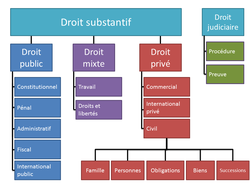
This working document served as a basis for a lecture given in French at the Académie des Sciences morales et politiques (French Academy of Moral and Political Sciences) on September 25, 2017, in the cycle of conferences conducted under the presidency of Michel Pébereau, Quelles réformes ? (What reforms?)
Consult the presentation (in French) of the conference cycle (2017).
It served as the basis for the publication of an article published in French in 2018 in the book directed by Michel Pébereau Réformes et transformations (Reforms and transformations).
March 6, 2018
Publications

Référence complète : Frison-Roche, M-A., La violence, ce lien qui unit la GPA et le mouvement #MeToo, Huffington Post, 6 mars 2018.
Lire le document de travail bilingue ayant servi de base à l'article.
La GPA est un des moyens par lequel la Route de la Violence dont les femmes sont les pavés est construite par les entreprises.
Le mouvement de lutte contre les violences faites aux femmes proteste contre cela.
Il souligne que cette violence est bâtie sur le "consentement" et le "sourire" des victimes.
Les auteurs de cette violence la justifie en se prévalant de ces consentements et de ces sourires : ils les font circuler comme "preuve" : le mouvement #metoo montre que c'est faux, que cela doit s'arrêter.
Nous-même, nous devons arrêter d'emprunter comme consommateurs cette Route de la Violence.

Updated: Oct. 25, 2017 (Initial publication: May 27, 2016)
Publications

► Full Reference: Frison-Roche, M.-A., Globalization from the point of view of Law, working paper, May 2017.
____
🎤 This working paper initially served as a basis for a synthesis report made in French in the colloquium organized by the Association Henri Capitant in the International German Days on the subject of "Le Droit et la Mondialisation" (Law and Globalization).
📝 Il sert dans un second temps de base à l'article paru dans l'ouvrage La Mondialisation.
📝 it serves as a second basis for the article (written in English, with a Spanish Summary) to be published in the Brezilian journal Rarb - Revista de Arbitragem e Mediação (Revue d`Arbitrage et Médiation).
It uses the Bilingual Dictionary of the Law of Regulation and Compliance.
____
► Summary of the Working: Globalization is a confusing phenomenon for the jurist. The first thing to do is to take its measure. Once it has been taken, it is essential that we allow ourselves to think of something about it, even if we have to think about it. For example, on whether the phenomenon is new or not, which allows a second assessment of what is taking place. If, in so far as the law can and must "pretend" to defend every being, a universal claim destined to face the global field of forces, the following question - but secondary - is formulated: quid facere? Nothing ? Next to nothing ? Or regulate? Or can we still claim that the Law fulfills its primary duty, which is to protect the weak, including the forces of globalization?
____
read the Working Paper below⤵️
Oct. 25, 2017
Publications
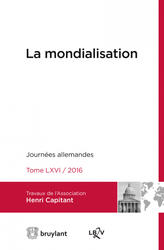
🌐follow Marie-Anne Frison-Roche on LinkedIn
🌐subscribe to the Newsletter MAFR Regulation, Compliance, Law
____
► Full Reference: M.-A. Frison-Roche, "La mondialisation du point de vue du Droit" (Globalisation from a legal perspective), in Association Henri Capitant, La mondialisation, t. LXVI/2016, Berlin, Bruylant, coll. "Travaux de l'Association Henri Capitant", 2017, pp. 11-30
____
📝read the article (in French)
____
____
🚧lire le document de travail bilingue sur la base duquel cet article a été élaboré, doté de développements supplémentaires, de références techniques et de liens hypertextes
____
► English summary of this article: Globalisation is a confusing phenomenon for lawyers. The first thing to do is to take the measure of it.
Once this has been done, it is essential to allow oneself to think something about it, or even to force oneself to think something about it. For example, on the novelty or otherwise of the phenomenon, which then enables us to assess what is being put in place.
If Law can and must "pretend" to defend every human being, a universal ambition that is intended to confront the global field of forces, then the next - but secondary - question is: quid facere?
Nothing? Less than nothing? Or regulate? Or do we still affirm that the Law fulfills its primary function, which is to protect the weak, even in the power struggle that is Globalisation?
____
📝read the summary and conclusive report of the symposium organised by the Association Henri Capitant, as part of the Journées internationales Allemande about La Mondialisation in Berlin, the 27 May 2016.
________

April 14, 2017
Publications

This working paper is the basis for an article written in French to be published in the French publication RÉGULATION, SUPERVISION, COMPLIANCEE, to be published in the RÉGULATIONS series at Éditions Dalloz.
This work uses the Compliance and Regulation Law bilingual Dictionnary.
____
This Working Paper aims to show the movement that starts from Regulation Law to Compliance Law, now in the process of being born.
In order to explain this movement, in order to anticipate the near future, in what it should not be and in what it should be, it is necessary to reconstruct how the Compliance Law was born of the Regulation Law, which has thus found the sources of the Public Services Law of which it had at first cut the roots (I).
Indeed Regulation Law has in a happy way renewed the Law but also narrowed its perspective. Today, the phenomenon of globalization and the need for public authority that States can not satisfy according to traditional legal methods implies the establishment of a sort of "global public service". This is done by the Law of Compliance which revolutionizes all legal systems, both Common Law and Civil Law (II).
Indeed, Compliance Law internalizes in some companies, the "crucial operators", the duty to make effective the "monumental goals" that the regulatory authorities have formulated and of which these companies must render globally effective. In this respect, the Law of Compliance is the extension of the Law of Regulation, which makes a new scope and in its aims and in its space. It is the whole of Law that is transformed.
The near future will tell if it is reflected in clashes, between companies and regulators, between Europe and the United States, or on the contrary by a pact of trust between the crucial operators and the Regulators. If this is achieved, the Law of Compliance, expressing the political dimension of the Law of Regulation, expressing the share of companies that ceases to be neutralized by the mechanics of the markets, will be an advancement of the Law. It is in this perspective that we must build the European Compliance Law.
Jan. 31, 2017
Publications

Référence complète : Frison-Roche, M.-A., La GPA, ou comment rendre juridiquement disponible les corps des êtres humains par l’élimination de la question, in Feuillet-Liger, B. et Oktay-Ozdemir, S. (dir.), La non-patrimonialité du corps humain : du principe à la réalité. Panorama international, coll. "Droit, Bioéthique et Société", n°17, éd. Bruylant, 2017, p. 365-382.
Pour une présentation générale de l'ouvrage.
Lire une présentation détaillée de l'ouvrage.
Ce article s'appuie sur un working paper qui inclut des développements supplémentaires, des références des notes et des liens hypertextes.
Le système juridique a posé sur le principe premier de la dignité de la personne humaine le principe secondaire de l'indisponibilité du corps de celle-ci, puisque disposer du corps humain permet d'une façon transitive de disposer de la personne comme l'on ferait d'une chose. Dans la mesure où le Droit a posé la summa divisio entre la "personne" et les choses comme première protection des personnes, il s'oppose ainsi à la cession des personnes à travers ce qui serait la disponibilité de fait ou de droit de leur corps.
L'engendrement par des femmes fertiles d'un enfant à seule fin de le délivrer à des personnes qui ont conçu le projet de devenir les parents de celui-ci (Gestation pour autrui -GPA) bute sur les deux principes articulés de la dignité des deux personnes que sont la mère et l'enfant et de l'indisponibilité des corps de la femme et de l'enfant. C'est pourquoi les entreprises qui organisent cette industrie qui alimente ce commerce mondial développent un discours juridique visant à désincarner cette pratique non pas tant pour justifier cette mise à disposition des corps des femmes afin de livrer les bébés à ceux qui versent les honoraires aux intermédiaires afin de devenir parents mais plus radicalement pour que la question même de la disponibilité ou de l'indisponibilité des corps impliqués par la pratique de la GPA soit une question qui ne se pose pas.
Il est pourtant nécessaire de rappeler qu'il n'y a GPA qu'appuyée sur une réalité corporelle, celle de la grossesse (I). Pour passer sous silence cet usage du corps de la femme, la GPA est présentée par ceux à qui cela rapporte comme un "don", cette qualification non-patrimoniale de ce qui est cédé, don pur de bonheur, permettant de rendre juridiquement licite l'usage du corps et la cession de l'enfant (II). La filiation est alors promue comme issue de la seule volonté et de la seule affection, qui fait naître l'enfant, l'effacement des corps permettant de mieux en disposer dans un marché mondial hautement profitable. Un Droit qui se scinde ainsi de la réalité corporelle devient proprement délirant.
Updated: Nov. 30, 2016 (Initial publication: Sept. 29, 2016)
Publications

► Full reference: M.-A. Frison-Roche, "Le Droit de la compliance" ("Compliance Law"), D.2016, Chron., pp.1871-1874.
____
► English Summary of the article: Constraints weighing on companies in terms of Compliance multiply and get heavier. But the notion is contradictory, uncertain, "strange", the expression of "conformity" being only a transposition in French.
Compliance appears today as the world internalisation of a public regulation, often conceived in the United-States, in firms, transformed in effectivity agents of global monumental goals: competition equity, fight against terrorism or States deemed unworthy (embargos).
Rather than borrowing scattered solutions, it is essential to build a "Compliance Law", properly European, to which everyone will be accountable.This new branch of Law is built teleologically on its Monumental Goals. It is driven by crucial businesses. The Judge is at its centre.
____
📝read the article (in French)
____
🚧Read the bilingual Working Paper on the basis of which the article was written.

Oct. 3, 2016
Publications

Ce working paper sert de support à un article publié dans l'ouvrage La réalité de la non patrimonialité du corps humain. Approche internationale, paru en janvier 2017 aux Éditions Bruylant.
Le système juridique a posé sur le principe premier de la dignité de la personne humaine le principe secondaire de l'indisponibilité du corps de celle-ci, puisque disposer du corps humain permet d'une façon transitive de disposer de la personne comme l'on ferait d'une chose. Dans la mesure où le Droit a posé la summa divisio entre la "personne" et les choses comme première protection des personnes, il s'oppose ainsi à la cession des personnes à travers ce qui serait la disponibilité de fait ou de droit de leur corps.
L'engendrement par des femmes fertiles d'un enfant à seule fin de le délivrer à des personnes qui ont conçu le projet de devenir les parents de celui-ci (Gestation pour autrui -GPA) bute sur les deux principes articulés de la dignité des deux personnes que sont la mère et l'enfant et de l'indisponibilité des corps de la femme et de l'enfant
Il est pourtant nécessaire de rappeler qu'il n'y a GPA qu'appuyée sur une réalité corporelle, celle de la grossesse (I). Pour passer sous silence cet usage du corps de la femme, la GPA est présentée par ceux à qui cela rapporte comme un "don", cette qualification non-patrimoniale de ce qui est cédé, don pur de bonheur, permettant de rendre juridiquement licite l'usage du corps et la cession de l'enfant (II). La filiation est alors promue comme issue de la seule volonté et de la seule affection, qui fait naître l'enfant
Frison-Roche, M.-A., Prohibition de la GPA : convergence absolue des droits de la femme et des droits de l'enfant, 2016.
Ne sera pas abordée ici le discours plus franc d'entreprises qui offre la prestation d'engendrement d'un enfant, dont celui-ci n'est plus la finalité mais dont il est lui-même un moyen pour obtenir par exemple l'accès à la nationalité ou un moyen de placer ses biens. La presse économique et financière a fait état de l'usage de la GPA comme technique financière (2016).
Oct. 1, 2016
Publications

Références complètes : Abécassis, E. et Frison-Roche, M.-A., GPA, la face cachée : sous le sucre des sourires, la misère des femmes, les cessions d'enfants et les honoraires des intermédiaires, Huffington Post, 1ier octobre 2016.
Dimanche 2 octobre, le magazine de M6 « Zone Interdite » prend pour sujet la GPA. Par une plongée dans cette pratique, image après image le documentaire donne à voir ce qu’est cette pratique que l’on veut faire passer pour médicale mais qui se différencie de la PMA en ce que c’est une pratique commerciale. A la surface, les images sont celles du bonheur des couples accueillant les bébés venant de loin. Puis, comme on soulève une couverture, apparaît la misère des femmes. Elles demandent à être choisies comme « incubateurs ». La violence est dans le rapprochement des images, entre la douceur de ces foyers tous différents mais proches dans ses joies partagées autour du berceau où le nouveau-né dort et la dureté des femmes qui choisissent d’engendrer pour ne pas mourir et garder en vie les autres enfants. Pourquoi jusqu’ici ces images avaient été peu rapprochées ? Parce que l’industrie de la fabrication des humains – agences, médecins et avocats – utilisent les premières images pour masquer les secondes. Mais « Zone Interdite » a rapproché les deux.
Updated: Sept. 6, 2016 (Initial publication: June 15, 2016)
Publications
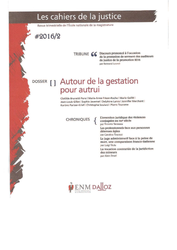
Référence complète : Frison-Roche, M.-A., Face au fait des maternités de substitution, que peut faire le juge ?, in Dossier "Autour de la gestation pour autrui", Les cahiers de la justice, Revue trimestrielle de l'École nationale de la magistrature, ENM/Dalloz, 2016.
La GPA, ou maternité de substitution, est une pratique qui conduit à s'interroger sur la normativité juridique à travers la relation entre le droit et le fait, que celui-ci soit technologique, sociétal, économique ou géographique.
Face aux litiges qui lui sont soumis, le juge français doit rendre une décision en application des règles de droit en vigueur, y compris européennes.
La question ici posée est de savoir si, au regard de ses pouvoirs et de son office, le juge peut et doit dégager des solutions techniques plus fines et s'il peut et doit répondre par principe.

Aug. 30, 2016
Publications

This article provides a basis for an article published in the Recueil Dalloz in French : "Le droit de la compliance".
‘Compliance’ issues have been increasingly discussed in recent years. Articles, handbooks, soft law, decisions or definition have been written. But nothing really converges. The term ‘conformity’ [conformité in French] is used in parallel, or even instead of the usual concept of compliance. There are as many definitions of what compliance is as there are authors writing on the matter. And yet it is used in manifold ways, from Competition law to International Finance law, from the hardest law (enforced with the help of the most stringent sanctions) to business ethics, according to which behaving should be enough to be compliant. At a time when compliance invades law, it should be first noted that we are too shortsighted to grasp the mechanism (I), whereas it is necessary to build a comprehensive Compliance law (II).
Read developments below.

Updated: June 18, 2016 (Initial publication: Nov. 8, 2015)
Publications

This Working paper will be used to support an French written article to be published in a book, set in the media/assets/couvertures/couverture-
This working paper was the basis for intervention in the symposium organized by the internet-espace-/">Journal of Regulation,
View the slides used as support at the conference (in French).
____
After emphasizing that the concept of "data" is uncertain, the first perspective is to draw the regulatory consequences of the fact that what is often referred to as the "object" of the data item (the person, the company for financial data, the economy for rating data, etc.), is only its source, "underlying", the data which is manufactured by a company : the real objet of the data is its purpose being the use for which the data is intended. The data is independent its underlying, is consolidated in the affected masses, takes an economic value based on the desires that have users, becomes available outside of time and space in the digital. This implies a specific
But the data is also the Janus of digital because new black gold, pure financial instrument, immaterial by nature, the data also keep a record of people, the underlying that would protect, that we would like inseparable, or the structure that one would want legitimately to attack thank to the new mechanism of
In addition, any

Feb. 27, 2016
Publications

Ce working paper sert de base à un article paru ultérieurement dans les Cahiers de la justice (Dalloz), dans un numéro consacré à la GPA.
La maternité de substitution (GPA) est une pratique. On peut, voire on doit, avoir une opinion à son propos. Pour ma part, j'y suis radicalement et définitivement hostile. Mais ce n'est pas l'objet de cette contribution que de défendre cette position. Puisqu'il s'agit d'un article d'introduction dans une publication plus particulièrement destinée à des magistrats, la perspective ici prise est celle du Juge, et la question posée est celle de savoir, si face à cette pratique, il peut techniquement faire quelque chose et s'il doit faire quelque chose au regard de son "office". Le thème de la GPA constitue un cas particulièrement net d'une question plus générale, de savoir s'il est même possible pour le Droit de faire encore "quelque chose" face à des phénomènes qui, technologiquement, économiquement, sociologiquement, semblent aujourd'hui "dépasser" le Droit. Le Droit serait-il donc désormais l'inférieur du Fait ? Peut-être. Autant le savoir. En tout cas, il faut y réfléchir. La GPA en est une bonne "épreuve", au sens probatoire du terme.
Les juges sont pris à partie, mais on ne peut reprocher au juge français de rendre des décisions en matière de GPA, puisque des justiciables portent des causes à trancher, que c'est leur office de le faire et qu'ils doivent le faire en application des règles de droit applicables, y compris les règles européennes, telles interprétées par la CEDH (I).
Dans son office, le juge a pour fonction de reprendre les solutions techniques, cela et pas plus, mais il peut aussi exprimer à travers la technique de motivation exprimer ce qui est la fonction même du Droit, à savoir la protection de la dignité des personnes, ici le cœur même de la question, comme l'exprima le 14 septembre 2015 le Tribunal Fédéral Suisse (II).